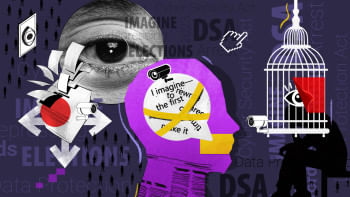How ‘tagging’ silences critical voices in Bangladesh

The political upheaval of August 2024, which saw the fall of Sheikh Hasina's government and the installation of an interim administration led by Nobel laureate Muhammad Yunus, has placed Bangladesh at a pivotal juncture in its democratic trajectory. Yet, despite this leadership shift, the divisive practice of "tagging"—labelling individuals or groups with politically charged identities—remains deeply entrenched in the nation's political culture. For the past 16 years, tagging has been used as a tool to stifle opposition, discredit social movements, and curtail public critique. This culture, prevalent under the Awami League and recently adopted by other movements, has systematically undermined Bangladesh's democratic discourse and the principles of social cohesion.
For over a decade and a half, the AL government employed tagging as a political instrument, branding dissenting voices as opponents, traitors, or allies of rival factions. Journalists, activists, and civil society figures who critiqued government policies were often labelled with affiliations to parties like the BNP or Jamaat-e-Islami, framing their criticisms as subversive rather than substantive. By labelling dissent as "anti-state," tagging became a strategic means of sidelining opposition and discouraging public discourse. This tactic generated an environment of caution, leading individuals and organisations to practice self-censorship to avoid the stigma associated with perceived political allegiances.
Tagging also emerged as a powerful tool against youth-led quota movements, particularly those organised by students advocating for government accountability, transparency, and justice. As these protests gained traction, participants were frequently tagged as "rebellious" or "anti-national," aiming to diminish the validity of their grievances and discourage broader civic engagement. Instead of being seen as passionate advocates for democratic reform, these young activists were framed as agitators or foreign-influenced disruptors of national stability. This branding not only stymied the growth of these movements but also pressured individuals within them to disengage, eroding the collective critical voice of the next generation.
With the establishment of the Yunus-led interim government, hopes for a fresh start in governance were high; yet the culture of tagging remains pervasive. Now, critics of government policy risk being labelled as "pro-Awami League" or "establishment supporters." This redirection of tagging creates a deflection mechanism, where critiques are dismissed not based on the content or merit of their arguments but on presumed political loyalty. This continuation of tagging shifts focus away from constructive dialogue, undermining the government's potential to engage meaningfully with the public.
Tagging has had a particularly harmful impact on some members of the Hindu community in Bangladesh, where minority Hindus who speak out are often labelled as "Awami supporters" or "Indian sympathisers." This labelling detracts from the real issues faced by some members of the Hindu community, such as communal violence and threats. By attributing Hindu dissent to foreign influence, tagging discredits their concerns, discourages them from voicing grievances, and isolates them further from mainstream society.
Indigenous communities in Bangladesh, particularly those residing in ecologically sensitive areas, have long been at the forefront of environmental activism. They consistently raise concerns about development projects that threaten their ancestral lands, livelihoods, and cultural heritage. However, their voices are often silenced through derogatory labels like "extremists" or "foreign agents." These tactics discredit their legitimate concerns, portray them as threats to national security, and justify forceful displacement. Such labelling not only undermines their rights but also perpetuates a culture of fear and intimidation, hindering their ability to participate meaningfully in decision-making processes that affect their lives.
Secular intellectuals and writers in Bangladesh who challenge religious fundamentalism or social conservatism often become targets of harassment and intimidation. By openly criticising these forces, they risk being labelled as "atheists" or "blasphemers," inciting hatred, violence, and social ostracism. Such tactics are employed to silence dissenting voices and maintain a climate of fear, hindering the free exchange of ideas and stifling critical thinking.
Women who challenge patriarchal norms or advocate for gender equality face intense online harassment and offline threats. They are often labelled as "immoral," "promiscuous," or "Westernised" to discredit their activism and discourage others from following their lead. This tactic reinforces traditional gender roles and silences those who seek to challenge the status quo, undermining the credibility of women's rights activists and perpetuating a culture of discrimination.
The rise of social media has intensified the use of tagging, as government supporters frequently employ online platforms to amplify labels against critics. With social media's reach and speed, tagging as a tactic has been turbocharged, allowing supporters to rapidly disseminate negative labels and misinformation about dissenting individuals or groups. Government-aligned online groups and influencers label critics as "foreign agents," "anti-national," or "pro-opposition," driving waves of online harassment that silence critics through overwhelming abuse and trolling. This decentralised yet coordinated use of tagging on social media normalises exclusionary and divisive rhetoric, hindering open dialogue on key issues.
The pervasiveness of tagging has fractured Bangladesh's public discourse, shifting the focus from policy critique to the identity of the critics themselves. This divisive practice discourages public engagement with ideas on their merits, reducing complex social issues to simplistic dichotomies. As tagging spreads, it promotes suspicion within society, fuels polarisation, and dampens the critical debates necessary for democratic development. By directing attention to presumed allegiances rather than substantive concerns, tagging undermines efforts for social cohesion and mutual understanding, impairing the foundations of Bangladesh's democratic aspirations.
For Bangladesh to evolve as a democratic society, overcoming the entrenched culture of tagging is crucial. To foster a public sphere that values critique and encourages constructive discourse, the government and civil society must move away from labelling individuals and groups based on perceived affiliations. A democratic society's resilience relies on its ability to engage with diverse perspectives without reducing them to simple tags. By creating space for genuine debate and dismantling the tagging culture, Bangladesh can build a more cohesive, inclusive, and dynamic society where critical voices, regardless of their affiliations, are respected for their contributions to national growth.
Debbrata Kumar Adhikary is a development practitioner.
Views expressed in this article are the author's own.
Follow The Daily Star Opinion on Facebook for the latest opinions, commentaries and analyses by experts and professionals. To contribute your article or letter to The Daily Star Opinion, see our guidelines for submission.


 For all latest news, follow The Daily Star's Google News channel.
For all latest news, follow The Daily Star's Google News channel. 





Comments